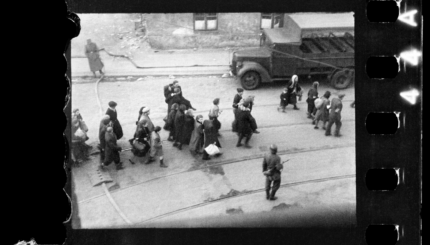One September afternoon I took the train from Berlin to Warsaw, as my characters had done. I wanted to see what they had seen. For the five and a half hours of that train ride I saw nothing but endless miles of birches, pines, fields… It was a warm and sunny day. The blue sky was cloudless. The sunlight glinted on the fields and stippled the birches with light. For my novel
The Train to Warsaw
, I would have to imagine those same birches and pines and fields in the dead of winter, coat them with snow and frost and turn the sky white.
I had an appointment to meet a journalist from one of the major Warsaw newspapers. He had suggested we meet in a tiny park near Gryzbowska St., a street that had once been inside the ghetto. And so I set off from my hotel to meet him.
There is nothing left of the former ghetto. In the more than 800 acres that once encompassed the ghetto, white Soviet realist style apartment buildings now cover block after block. Of the apartment buildings, the shops, the synagogues from before the war (with the exception of the Nozyk Synagogue), nothing remains. On one block several red brick buildings from before the war are still standing; in the courtyard of an apartment building a piece of the red brick ghetto wall still exists. One or two other buildings are still there. But that is all. The ghetto was burned to the ground by the Nazis during the Ghetto Uprising of April 1943.
And of the former life that once hummed in this corner of the earth, nothing remains.
The journalist and I sat down on a small stone bench. Scattered around the pocket park, several mothers sat rocking baby carriages beneath a sunny sky. There was no one else. The journalist and I talked quietly. All of a sudden I heard, coming from the left, the tramping of boots on cobblestone. The sound grew louder. Five SS men in uniform, smoking, armed, came into view. They didn’t look like extras in a film; in fact there were no cameras or crew anywhere. The uniforms looked lived-in, the boots were creased with wear. I thought I was hallucinating. I had done so much research on the Warsaw Ghetto that I had begun to see visions. I turned to the journalist. Are those SS men? I asked, incredulous. Absolutely, he replied.
Now I heard the tramping of boots coming from the right. I turned my head and saw a straggling group of partisans coming toward us, walking single file. One had his head bandaged, all wore outfits that were ragged and torn. One had a bloodied shirt sleeve, all had tin cups attached to their belts. They too were armed. The Polish Home Army? I whispered. Absolutely, he informed me. An SS man had placed a straw basket on the ground. Backs bent, a look of resignation on their faces, each one came up to the SS man and dropped his weapon in the basket.The last man shook the hand of the SS man, who dropped his cigarette and ground it out with the toe of his leather boot. They turned and walked off.
What just happened? I asked the journalist. The Polish Home Army has just surrendered to the SS, he informed me. What? I asked in disbelief. Every year on the same date, in the same place, at the same time, the Polish Home Army surrenders to the SS. But why? I asked. Why in the world would they re-enact their surrender of all things? He shrugged. He had no answer.
This part of town was so quiet now, the streets nearly deserted. Once there had been an ungodly din here. Crowds of up to 500,000 individuals surging through the streets, a madhouse swarming with people, the pavement and streets clogged with the dying and dead. Then there had been no peace, only terror. Everyone in a mad rush, running, pushing forward against the crowds. Back then to stop was to die, to slow down was to be shot or dragged off.
Now a small boy pushed a scooter beneath a soft blue sky, a woman re-tied the strings of a baby’s bonnet. Now the place was so peaceful you could hear the sound of leaves softly blown by the wind. How was I to imagine what had once taken place here?
The Visiting Scribes series was produced by the Jewish Book Council‘s blog, The Prosen People.
The Jewish world is full of debates. Get the latest in MyJewishLearning’s weekly blogs newsletter.

